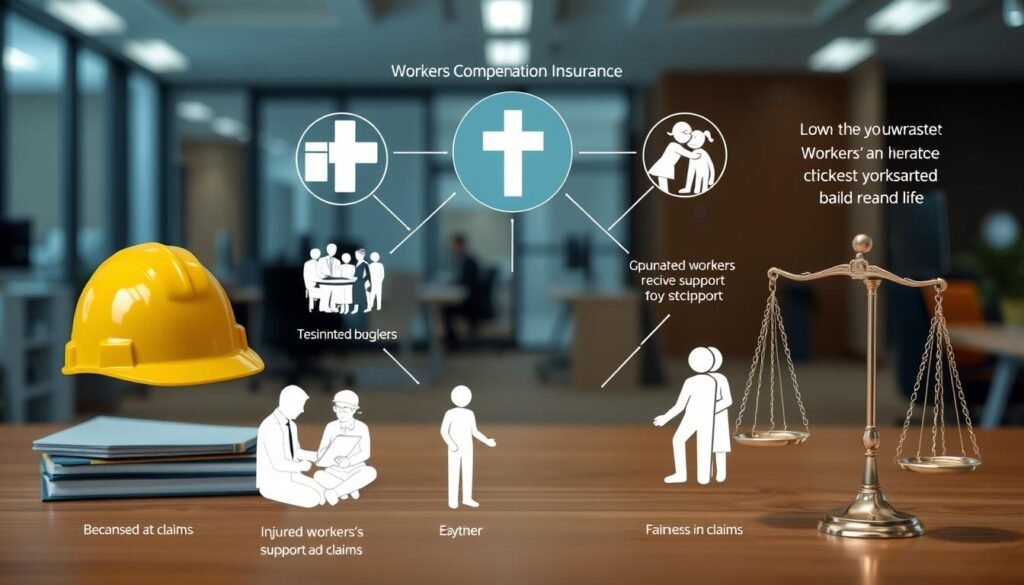The freelance world is growing fast. But with more freedom comes more risk. Freelancers often deal with errors, legal issues, and client complaints. These can hurt their money and reputation a lot.
Without the right insurance, one mistake can be very costly. It can take away your earnings and harm your good name. Yet, many freelancers don’t know how important this insurance is. It’s key to keeping their careers safe.
This guide will clear up what professional liability insurance for freelancers is all about. We’ll talk about what it covers, why it’s needed, and the risks in different fields. Learn how to avoid the dangers freelancers face every day.
Table of Contents
ToggleKey Takeaways
- Freelance professional indemnity insurance protects against client claims for professional errors.
- Understanding specific coverage needs is essential for various freelance industries.
- Potential high costs can arise from claims without proper insurance.
- Professional liability insurance can help maintain your reputation.
- Many insurers offer tailored solutions, making it crucial to shop wisely.
- Cost factors include industry, experience, and contract value.
What is Freelance Professional Indemnity Insurance?
Freelance professional indemnity insurance is a key protection for freelancers. It helps cover legal costs and damages from mistakes in their work. This is very important for those in fields like consulting, graphic design, or writing.
Freelancers face risks not seen by those in big companies. A huge 100% of freelancers know they are at risk. This insurance helps with claims about missed deadlines, not delivering services, and even keeping secrets.
Freelancers on sites like Fiverr and Upwork must show they have insurance. This makes having this insurance even more important. Most policies suggest getting at least £1 million in coverage.
Not having enough protection can be very costly. Claims for professional indemnity are very common. Without insurance, freelancers could face big financial problems from legal issues.
Do Freelancers Need Professional Indemnity Insurance?
Freelancing comes with unique risks. Self-employed indemnity insurance helps protect your business. It’s not always required by law, but it’s crucial for many. Clients often ask for proof of insurance before they sign contracts.
Imagine a designer making a product that breaks a trademark law. The costs could reach £10,000. This shows why professional indemnity insurance is important. Freelancers working in public places, like cafes, also need public liability insurance. This covers injuries to others while you work.
Freelancers should think about other insurance types too. Equipment insurance can cover tools like laptops when you work outside. Cyber insurance is key for handling customer data. It protects against cyber threats and ransomware. Income protection insurance ensures you keep earning if you’re sick or hurt.
There are many insurance options, like Dinghy, made for freelancers. These policies offer legal help and support for late payments over £200. You can also get insurance for things like commercial auto or intellectual property.
In short, freelancers might not always need insurance, but it’s wise. It helps avoid big financial losses and meets client demands. It’s a smart choice for anyone freelancing.
Why Freelancers Should Consider Professional Indemnity Insurance
Freelancers face many challenges where mistakes can cost a lot. Professional indemnity insurance helps protect them from these mistakes. It keeps them safe from expensive lawsuits that could ruin their finances.
Many freelancers don’t have enough insurance, making them very risky. In 2022, 44% of small UK businesses had no insurance. Without it, freelancers might struggle to find work because clients often ask for proof of insurance.
Having professional indemnity insurance shows clients you’re serious and professional. It makes you stand out in a crowded market. Policies are affordable, starting at £9 a month, which is a smart investment.
Good insurance gives freelancers peace of mind. It lets them work without worrying about risks like negligence or mistakes.
Risk management in freelancing.
Freelancers need to manage risks well to keep their business safe and stable. Freelance risk management insurance is key. It gives legal protection against claims of negligence, errors, or omissions. Knowing the risks in your field can help you avoid big problems.
Legal protection against claims of negligence, errors, or omissions.
Freelancers are at risk of legal trouble from clients. Professional indemnity insurance, or errors and omissions insurance, helps a lot. It protects your business from claims that could hurt your finances. Getting this insurance is important to defend against claims that might come up years later.
Industry-specific risks for freelancers.
Every freelance job has its own risks. Creative freelancers might face copyright issues, while IT pros could deal with data breaches. Knowing these risks helps you get the right insurance. Talking to companies like WithJack and PolicyBee can help you find the right coverage for your needs.
Benefits of Professional Indemnity Insurance for Freelancers
Getting professional indemnity insurance is a smart move. It gives you peace of mind knowing you’re protected against lawsuits. This insurance helps you handle risks and recover quickly from claims. It’s key for keeping your business stable and building trust with clients.
Financial protection in case of client lawsuits.
Client lawsuits are a big worry for freelancers. Professional indemnity insurance acts as a financial shield. It covers legal costs and settlements, which is crucial in complex legal situations. With good insurance, you can avoid financial shocks and keep your service quality high.
| Type of Insurance | Description | Key Benefits |
|---|---|---|
| Professional Indemnity Insurance | Covers claims of negligence, errors, or omissions in services provided | Legal protection, financial stability, peace of mind |
| General Liability Insurance | Protects against claims of bodily injury or property damage | Minimizes liability risks during client interactions |
| Cyber and Data Risk Insurance | Covers recovering lost data and mitigating financial impacts from cyber incidents | Essential in today’s digital landscape, protects against data breaches |
| Business Interruption Insurance | Covers loss of income during unforeseen disruptions | Ensures continuity of operations despite challenges |
Understanding Professional Indemnity Insurance for Freelance Professionals
Freelancers often face high risks of lawsuits. It’s key to know about coverage of professional indemnity insurance. This insurance protects against errors, omissions, and negligence in work. It also covers legal costs and damages if a lawsuit wins.
What Does Freelance Professional Indemnity Insurance Cover?
This policy helps freelancers by covering legal costs for client claims. It includes fees for defending against lawsuits or settlements due to mistakes.
Coverage for legal fees and claims.
Coverage of professional indemnity insurance includes legal fees for claims. It also covers defending against negligence claims and other costs. For many freelancers, this protection is crucial, especially with big clients or in competitive fields.
Protection against errors, omissions, and professional negligence.
Errors and omissions coverage is key for freelancers. If a client says there was negligence, the policy helps. It lets freelancers work without worrying about lawsuits.
Industry-specific exclusions and limitations.
Freelancers need to know their policy’s details. Some industries have special rules that might limit freelance PI insurance coverage. Always check policy terms for the best protection for your field.
Freelance Professional Indemnity Insurance by Industry
Freelancers come from many different fields, each with its own challenges and risks. They need insurance that fits their specific needs. This is because different industries have different legal and operational risks.
Freelancers must follow certain rules and meet certain expectations in their field. This makes it crucial to choose insurance that is right for their industry.
Professional Indemnity Insurance for Freelance Contractors
Freelance contractors, like those in construction, IT, or consulting, need insurance that matches their work. In the freelance world, the risk of lawsuits from clients, subcontractors, or the public is high. This is why good insurance coverage is key.
Scenarios like poor communication, unclear project definitions, or accidental sharing of sensitive info can lead to lawsuits. Contractors need insurance to protect against these risks.
Coverage should include:
- Legal costs for representation in disputes
- Compensation for damages awarded in lawsuits
- Protection from claims of negligence, errors, or omissions
Contractors also rely on specialized equipment. Losing or damaging this equipment can cause delays or disruptions. Good insurance should cover equipment loss, helping contractors keep working.
When picking insurance, contractors should think about the complexity of their work and the cost of legal issues. The insurance policy should also cover the areas where they work. Choosing the right insurance helps keep finances stable and gives peace of mind in the freelance world.
Risks and coverage for freelance contractors, Examples of contractor-specific claims.
Freelance contractors face unique risks. They need professional indemnity insurance. It’s key to know the claims they might face and how coverage helps.
Contractors often deal with:
- Project delays due to mismanagement or failure to meet contract specifications.
- Accidental injuries or property damage during work.
- Errors in project delivery that cause client dissatisfaction and financial losses.
Contractor liability insurance is vital. It protects against these issues. It covers legal costs for claims against contractors.
For example, a contractor might face a lawsuit for not finishing on time. The client could claim for lost income. With the right coverage, the contractor gets legal help to fix the problem and defend against lawsuits.
In short, knowing common claims helps contractors choose the right insurance. This ensures they’re well-protected in a competitive world.
Professional Indemnity Insurance for Freelance Journalists, Importance of indemnity insurance for freelance journalists.
Freelance journalism has its own set of challenges. Journalists often face claims about defamation, intellectual property, and content disputes. Professional indemnity insurance is key for their careers, helping them deal with these issues confidently.
Protecting against defamation and content disputes.
Freelancers need good coverage to protect themselves from lawsuits. Defamation claims can harm their reputation and finances. Freelance liability protection is essential, not just a safety net.
Many freelance writers have improved their contracts. They’ve removed clauses that could limit their coverage. This shows the importance of negotiating well.
Media organizations are aware of the risks freelance journalists face. They offer discounted policies through professional groups. This helps address insurers’ concerns, especially for investigative reporting.
Insurance costs for freelance journalists vary, starting at $3,500 for $1 million coverage yearly. Higher costs come from the type of reporting or legal fees. It’s crucial to understand policy details and negotiate good terms. Choosing the right insurance provider can greatly benefit freelancers.
Professional Indemnity Insurance for Freelance Designers, Why designers need indemnity insurance.
Freelance designers work in a world full of creativity. But, this creativity brings big risks. They might face problems like copyright issues or mistakes in their work. Getting insurance helps protect them from these risks.
Common risks: intellectual property infringement, design errors.
Designers deal with legal issues that can hurt their business and reputation. Some common problems include:
- License violations, leading to costly legal disputes.
- Breach of contract, resulting in financial penalties.
- Broken confidentiality agreements, risking client trust.
- Reputational damages arising from perceived negligence.
Insurance for design errors can help with these risks. Without it, designers might have to pay for legal fees and court costs. These costs can add up to thousands of dollars. Even though insurance isn’t required by law, big clients often ask for it.
Graphic designers might also want to look into other types of insurance. This includes public liability, cyber breach insurance, contents insurance, and personal accident insurance. Tapoly offers flexible and affordable insurance for graphic designers and freelancers. This way, they can work without worrying about unexpected problems.
Professional Indemnity Insurance for Freelance Editors
Freelance editors face unique challenges. Errors in editing can cause big problems. This includes misunderstandings that affect authors, publishers, and readers.
Freelance editor insurance is key. It protects against claims of negligence. It also offers financial help in legal disputes.
Professional indemnity for editors is like malpractice insurance for doctors. It’s crucial for protecting editors from lawsuits. Editing is complex, so it’s important to have coverage.
Higher coverage limits mean higher premiums. But they also mean more financial protection.
Editors should think about their risk and get insurance. It’s important for their professional integrity. They might also want to look into health insurance, business interruption coverage, and property insurance.
Editors’ professional risks and the need for insurance, Protecting against errors in editing and publishing.
Being an editor comes with many editorial risks. These risks can affect the quality and accuracy of work. Mistakes in editing can lead to wrong information. This can cause big financial problems for freelance editors.
Freelance editors need to know about errors and omissions insurance. This insurance helps protect against claims from mistakes. It also covers defamation and other issues that might happen because of editorial choices.
Editors face big risks like defamation claims. Knowing these risks helps them get the right insurance. Talking about insurance with clients makes things clear and avoids misunderstandings.
Freelance editors often deal with contracts that ask for liability insurance. This can make it hard to keep their work professional. Clear job roles and talking with clients about what’s not included in the contract can help. It’s good to ask to remove unclear insurance parts that could cost a lot if there’s a claim.
There are many insurance options for editors, like Chubb and Hiscox. Media perils liability insurance covers things like copyright issues. Getting the right insurance lets freelance editors focus on their work and keep their clients’ trust.
| Insurance Type | Coverage Offered | Recommended Providers |
|---|---|---|
| Errors and Omissions Insurance | Protection against claims of negligence, including defamation | 360 Coverage Pros, The Hartford, Hiscox |
| Media Liability Insurance | Coverage for copyright infringement, libel, plagiarism | AIG, CNA Hardy, Chubb |
| Worker’s Compensation Insurance | Proof of independent contractor status | Next Insurance, biBerk |
Freelance editors who understand their job well will do better. They will be more professional and their clients will trust them more.
Professional Indemnity Insurance for Freelance Translators, How translation errors could lead to claims.

Freelance translators face a world where every detail matters. A small mistake can cause big problems, leading to legal issues. That’s why they need professional indemnity insurance. It protects them from claims due to errors, keeping their work safe and reliable.
Importance of accuracy and liability protection for translators
In translation, mistakes can hurt clients a lot. Freelance translator insurance helps by covering these risks. It’s key for keeping businesses running and clients happy.
Many translators need to know about errors and omissions insurance. This policy helps with claims of negligence or poor work. It also helps with legal costs and paying out for mistakes. Policies have limits, which depend on the translator’s situation.
For example, in October 2018, there were different insurance options available. Here are a few:
| Annual Premium | Per Occurrence Limit | Annual Aggregate Limit | Deductible |
|---|---|---|---|
| $270 | $250,000 | $250,000 | $1,000 |
| $416 | $500,000 | $500,000 | $500 |
| $270 | $1,000,000 | $1,000,000 | No deductible |
Some contracts ask for at least $2,000,000 in coverage. Clients might ask for proof of insurance to protect themselves. Freelancers should check their contracts and policies well.
Even if some translators don’t think they need insurance, it’s becoming more common. Agencies are asking for it more often, showing its importance in the field.
Choosing the Right Professional Indemnity Insurance for Freelancers
Choosing the right insurance is key for freelancers. Each freelancer has different needs based on their field, business style, and risks. It’s important to look at the insurer’s reputation, what they cover, and what they don’t. This ensures you get the right protection without spending too much.
How to Select the Best Insurance Provider for Freelancers
When picking an insurance provider, freelancers should focus on a few things:
- Insurer Reputation: Check out what others say about them.
- Coverage Options: Look for policies that fit your needs.
- Policy Exclusions: Know what’s not covered.
- Cost of Premiums: Find a balance between cost and coverage.
Coverage options and premium comparison
Freelancers should compare insurance prices carefully. Knowing what each policy offers helps you choose wisely. The table below shows how different factors affect prices:
| Type of Coverage | Impact Level | Average Premium Range |
|---|---|---|
| Professional Indemnity | High | $500 – $2,000 |
| Product Liability | Medium | $300 – $1,500 |
| Cyber Liability | Medium | $400 – $1,800 |
| Public Liability | High | $350 – $1,200 |
Knowing these differences helps you compare prices better. This way, you can find a policy that protects you well without costing too much. By focusing on these key points, freelancers can make smart choices about their insurance.
Professional Indemnity Insurance for Freelance Lawyers and Solicitors
Freelance lawyers and solicitors face unique risks. They must give good legal advice and defend clients. This makes them open to negligence claims. Getting professional indemnity insurance is key to cover legal fees and other legal risks.
Specific needs of freelance lawyers and solicitors
Freelance lawyer insurance must cover many legal aspects. This includes:
- Legal advice and representation
- Negligence claims, whether from mistakes or not doing something
In California, lawyers don’t have to buy malpractice insurance. But, if they work more than four hours, they must tell clients in writing. Lawyers can include freelance attorneys in their policies without extra costs if the work is certain conditions.
Coverage for legal advice, representation, and negligence claims
It’s important to know what coverage is needed. The rule about ‘adequate and appropriate’ insurance mainly applies to reserved legal services. For non-reserved services, insurance is just a suggestion. But, getting insurance is a way to protect against risks.
What affects coverage includes:
- Client type and how often they work together
- The value and number of cases handled
- Claims history and specific risk assessments
Freelance solicitors need to keep records of their insurance choices. They should check their policies often and tell clients about their insurance. The Solicitors Regulation Authority says insurance must be clear and open.
Being open with clients builds trust. It also protects both sides if a claim happens. Knowing these needs helps lawyers work safely and protects them from legal field risks.
The Cost of Freelance Professional Indemnity Insurance
The cost of freelance professional indemnity insurance changes based on several things. These include the industry, experience, contract value, and what kind of coverage you need. Knowing these helps freelancers make smart choices about affordable protection and risk management.
How Much Does Freelance Professional Indemnity Insurance Cost?
Several important factors affect the cost of freelance professional indemnity insurance:
- Industry: Different fields have different risks, which changes how much insurance costs. For example, IT freelancers might face different risks than marketing consultants.
- Experience: More experienced freelancers usually pay less because they’ve shown they can handle risks well.
- Contract Value: Bigger contracts mean more coverage is needed, which can make costs go up.
- Coverage Needs: The type of insurance you choose affects the price. You might add extra coverage for specific risks.
Average Premiums for Freelancers Across Different Sectors
Knowing average prices helps freelancers plan their budgets. Here’s a table showing median costs for different insurance types:
| Insurance Type | Cost per Hour | Cost per Day | Cost per Week | Cost per Month |
|---|---|---|---|---|
| General Liability Insurance | $5.00 | $5.30 | $7.70 | $7.20 |
| Professional + General Liability Insurance | $13.00 | $56.00 | $82.00 | $60.00 |
| Equipment Insurance ($1,000 Coverage) | N/A | N/A | N/A | $6.00 |
| Equipment Insurance ($2,500 Coverage) | N/A | N/A | N/A | $15.00 |
About 84% of freelancers choose $1 million liability coverage. This shows a trend towards full protection. Services like Thimble let freelancers buy coverage by the hour or day, as needed.
How to Reduce the Cost of Professional Indemnity Insurance
It’s important to find ways to lower the cost of professional indemnity insurance. Freelancers can try a few things:
- Shop Around: Looking at different insurance providers can help you find better deals.
- Policy Customization: Tailor your coverage to fit your business needs, avoiding unnecessary extras.
- Risk Management Practices: Good practices can lower the chance of claims, which can lower premiums over time.
Tips for reducing premiums without compromising coverage.
Freelancers can lower their insurance costs without losing coverage. A key strategy is to manage risks well. By improving skills, freelancers can make fewer mistakes, which can lower insurance costs over time.
Another way is to increase deductibles. This can make premiums lower. It helps freelancers use their money better. Getting discounts by using the same provider for all policies is also smart. It makes managing everything easier and can save money.
It’s important to keep coverage up to date. This ensures freelancers are protected as their risks change. Also, having no claims can lead to lower premiums. It shows freelancers are good at managing risks.
Being part of professional groups can get freelancers discounts. These groups offer lower rates because they manage risks together. Freelancers can also save by making sure outside contractors have their own insurance. This way, freelancers don’t have to worry about claims from others.
By using these smart ways to lower insurance costs, freelancers can stay safe and keep their finances healthy.
Legal and Tax Implications of Professional Indemnity Insurance
Freelancers face many legal and tax issues with professional indemnity insurance. It’s key to know the legal needs for insurance. Many jobs need specific coverage to be legal. Knowing this helps freelancers stay legal and protect their work.
Legal Requirements for Freelancers in Certain Professions
In some jobs, insurance is not just smart but required by law. For example, jobs like accounting, architecture, and law need it. This is to protect against mistakes or negligence. Not having it can cause big fines and stop you from working.
Industry-specific legal regulations for freelancers
Each industry has its own rules for insurance. Freelancers in healthcare, engineering, and consulting need to know these rules. Knowing these helps them get the right coverage and stay safe from risks.
Tax Benefits of Professional Indemnity Insurance
Freelancers can get tax breaks for their insurance costs. Many places let you deduct these costs as business expenses. This lowers your taxes. It’s smart to keep records of your insurance payments to get the most tax benefits.
How freelancers can deduct insurance costs as a business expense
To deduct insurance costs, freelancers should keep good records. This means saving invoices and policy details. When tax time comes, having these records makes it easier to claim deductions. This way, freelancers can enjoy the tax perks of their insurance.
Understanding the tax implications of indemnity insurance premiums.
Freelancers need to know how insurance premiums affect their taxes. The cost of professional indemnity insurance can be a business expense. This means it can lower the income you have to pay taxes on.
It’s important to keep good records of these expenses. This helps you get the most tax deductions when you file your taxes. But remember, you can only deduct the actual premium cost. You can’t include legal fees or other related costs.
The insurance must be for a real business reason to be deductible. Freelancers should talk to a tax expert to make sure they report it right. The cost of premiums can change based on your profession and how much you earn.
It’s also key to know that the insurance must be for your business. Different jobs have different rules about deducting insurance costs. Working with insurance brokers can help you understand your options better. This way, freelancers can use tax laws to their advantage.








